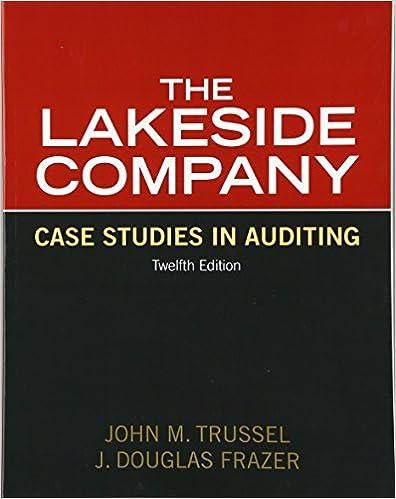Question
Identify the type of accounting change that is described in each item, and indicate whether the prior years financial statements must be restated when presented
Identify the type of accounting change that is described in each item, and indicate whether the prior years financial statements must be restated when presented in comparative form with the current years financial statements. Also indicate if the company is required to justify the change. Assume ASPE is followed. Assume that each item on the following list would have a material effect on the financial statements of a private enterprise in the current year:
| Type of Change | Restatement of Prior Years in comparative Financial Statements | |||||
|---|---|---|---|---|---|---|
| 1. | A change to the income taxes payable method from the future income taxes method | select a type of change Change in accounting policyChange in accounting estimateChange in classificationCorrection of an errorChange in accounting policy / Change in accounting estimateChange in accounting policy / Correction of an errorChange in accounting estimate / Correction of an errorNo change | select an option YesNoYes/NoN/A | |||
| 2. | A change in the estimated useful life of previously recorded capital assets where the straight-line depreciation method is used | select a type of change Change in accounting policyChange in accounting estimateChange in classificationCorrection of an errorChange in accounting policy / Change in accounting estimateChange in accounting policy / Correction of an errorChange in accounting estimate / Correction of an errorNo change | select an option YesNoYes/NoN/A | |||
| 3. | A change from deferring and amortizing development costs to immediate recognition of development costs as expense; the change to immediate recognition arises because the company does not have the resources to market the new product adequately | select a type of change Change in accounting policyChange in accounting estimateChange in classificationCorrection of an errorChange in accounting policy / Change in accounting estimateChange in accounting policy / Correction of an errorChange in accounting estimate / Correction of an errorNo change | select an option YesNoYes/NoN/A | |||
| 4. | A change from including the employer share of Canada Pension Plan and Employment Insurance premiums as a separate payroll tax expense to including them with salaries and wages expense on the income statement | select a type of change Change in accounting policyChange in accounting estimateChange in classificationCorrection of an errorChange in accounting policy / Change in accounting estimateChange in accounting policy / Correction of an errorChange in accounting estimate / Correction of an errorNo change | select an option YesNoYes/NoN/A | |||
| 5. | The correction of a mathematical error in inventory costing that was made in a prior period | select a type of change Change in accounting policyChange in accounting estimateChange in classificationCorrection of an errorChange in accounting policy / Change in accounting estimateChange in accounting policy / Correction of an errorChange in accounting estimate / Correction of an errorNo change | select an option YesNoYes/NoN/A | |||
| 6. | A change from straight-line to double-declining-balance method of depreciation in recognition of the effect that technology has on the pattern of benefits received from the assets use | select a type of change Change in accounting policyChange in accounting estimateChange in classificationCorrection of an errorChange in accounting policy / Change in accounting estimateChange in accounting policy / Correction of an errorChange in accounting estimate / Correction of an errorNo change | select an option YesNoYes/NoN/A | |||
| 7. | A change from presenting unconsolidated financial statements (using the cost method for subsidiaries) to presenting consolidated financial statements for the company and its two long-held subsidiaries | select a type of change Change in accounting policyChange in accounting estimateChange in classificationCorrection of an errorChange in accounting policy / Change in accounting estimateChange in accounting policy / Correction of an errorChange in accounting estimate / Correction of an errorNo change | select an option YesNoYes/NoN/A | |||
| 8. | A change in the method of accounting for inventory for tax purposes to conform to the method of accounting for inventory for financial accounting purposes; as a result, both future and current taxes payable changed substantially | select a type of change Change in accounting policyChange in accounting estimateChange in classificationCorrection of an errorChange in accounting policy / Change in accounting estimateChange in accounting policy / Correction of an errorChange in accounting estimate / Correction of an errorNo change | select an option YesNoYes/NoN/A | |||
| 9. | A change from the periodic inventory method to the perpetual inventory method with the introduction of scanning equipment and updated computer software (FIFO used) | select a type of change Change in accounting policyChange in accounting estimateChange in classificationCorrection of an errorChange in accounting policy / Change in accounting estimateChange in accounting policy / Correction of an errorChange in accounting estimate / Correction of an errorNo change | select an option YesNoYes/NoN/A | |||
| 10. | A change in an accounting method due to a change in a primary source of GAAP |
Step by Step Solution
There are 3 Steps involved in it
Step: 1

Get Instant Access to Expert-Tailored Solutions
See step-by-step solutions with expert insights and AI powered tools for academic success
Step: 2

Step: 3

Ace Your Homework with AI
Get the answers you need in no time with our AI-driven, step-by-step assistance
Get Started


